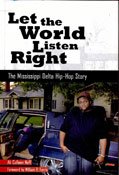Wednesday, October 14, 2009
When I heard about Ali Neff's book on the Clarksdale hip-hop scene, I was relieved that someone had finally decided to talk about something other than the blues. Someone was willing to engage the Delta on contemporary, relevant terms; someone was ready to listen to the young people. But Neff's "Let the World Listen Right" (University Press of Mississippi, 2009, $50) begins and ends with the blues, so at times I forgot I was supposed to be reading about hip-hop. Despite such emphasis, Neff commendably links the music of the Delta's past with that of the present, highlighting both the contiguity of Delta culture and the parallel structure and content of the music itself.
Tourists seem to think of the blues as the weary song and dance of beaten-back, sun-wrinkled old folk, but Neff reminds us that the blues were once the soundtrack of youth, sex, aggression and power, occupying much the same sphere as today's hip-hop.
"The dynamic nature of Black Atlantic music defies genre labels and historical definitions, which in turn frustrates a dominant market that relies on the branding of an authentic product," she explains. Blues artists enjoyed heightened community stature, much as Clarksdale rapper TopNotch the Villain receives neighborhood recognition and discounts at local clothing shops.
Neff points out the presence of codified language in both blues and rap, how lyrics can be read one way by the general public and carry richer meaning to insiders. Both blues and hip-hop artists often create alternative personas, complete with second names, just as they both "sample" music and lyrics from other sourcesother artists, hymns, preachers or common proverbs.
The high value placed on oral communication, what Neff terms "musical talk," is fueled in part by the Delta's high illiteracy rates. Privileged oral tradition is everywheredelivered from pulpits, woven into schoolyard rhyming games, shouted in juke joints and, more recently, rapped in hip-hop clubs. Neff locates Delta rap in the global hip-hop movement, outlining how phenomena like BET and the Internet, as well as the Great Migration of southern blacks to places like Chicago and Long Beach, creates direct links between urban and aggregation ghettos.
Neff also approaches her subject academically and respectfully, dissecting sounds in terms of rhythm, mentioning the African concept of nommothe life-giving power of the wordand calling attention to subversion hidden in the hypermasculinity and violent tropes of both blues and hip-hop.
"Let the World Listen Right" communicates the resourcefulness of its key subjects, members of the Clarksdale-based crew DA F.A.M., but encounters difficulty translating their charisma and wit to page.
My advice: Read the book for historical context and watch Neff's half-hour film (by the same name, for free at http://www.folkstreams.net) to experience the potency and immediacy that is Delta hip-hop.

Comments
Use the comment form below to begin a discussion about this content.
Sign in to comment
Or login with:
OpenID